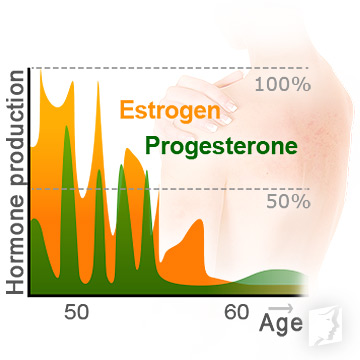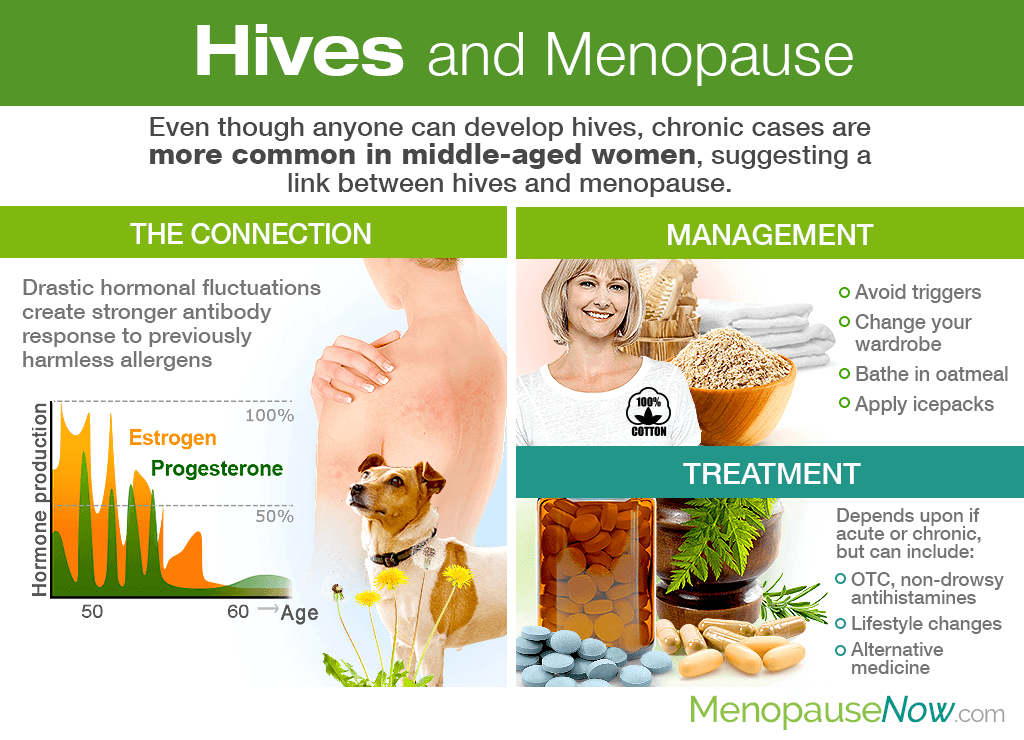Because hormones are intricately connected with the body's immune system, any periods of radical hormonal changes - such as menopause - can exacerbate or evoke allergies in women, hives being just one of the many that can occur.
Continue reading to learn more about hives and menopause, including the connection between the two and how to go about managing and treating the symptom for long-term relief.
About Hives
Also known as urticaria, hives is an allergic reaction that provokes itchy welts on the skin, varying in size and shape from small spots to large blotches that cover several inches of the body.
While most acute cases of hives disappear within 24 hours, chronic bouts of hives can last for months or years without end, coming and going with no clear pattern.
While anyone can develop chronic hives, they are more common in middle-aged women, leading researchers to believe there may be a connection between hives and menopause.
Hives and Menopause Connection

Menopause is a transformative period in women's lives as their ovaries wind down reproductive functions, provoking drastic hormonal fluctuations.
These variations in estrogen and progesterone levels create a stronger antibody response to previously harmless allergens, meaning that certain substances that didn't trigger allergies before now can.
General triggers of hives can range from foods and medications to perfumes and dyes; pollen; animal dander; and environmental factors, such as emotional stress, hot showers, and sunlight.
Also, it is not uncommon for underlying medical conditions to also cause hives during menopause. They include immune system disorders, like lupus; certain types of cancer, like lymphoma; thyroid conditions; and bacterial or viral infections, such as those caused by HIV, Epstein-Barr virus, or hepatitis virus.
How to Manage Menopause Hives

Hives in and of themselves are not a life-threatening symptom. Nevertheless, persistent itchiness may make some women look for measures to bring soothing relief. Try the following:
Take antihistamines. Without a doubt, the most common way to manage hives is by taking antihistamine medications to ease the allergic reaction in the body.
Keep a diary. If you suspect that your hives are triggered by certain foods, perfumes, environmental factors, etc., it may be useful to keep record of the episodes to be able to better pinpoint the cause.
Avoid triggers. One of the best ways to prevent the onset of menopause hives is simply by avoiding what is causing them, if the cause is already known.
Change your wardrobe. Avoid further skin irritation during a breakout by wearing loose, cotton clothing. By all means, do not pull out your clothing that is tight, rough, scratch, or made of wool.
Bathe in oatmeal. This time-tried method has been used for centuries for combatting allergic rashes. Choose uncooked or colloidal oatmeal, which is finely ground and designed for baths.
Apply ice packs. Soothe your skin and resist the urge to scratch by covering the area with towel-wrapped ice packs or other cool, wet compresses.
How to Treat Them

For acute cases of perimenopause hives with known triggers, women are commonly recommended to take an over-the-counter, non-drowsy antihistamine and partake in any of the aforementioned management techniques.
For chronic hives, menopausal women are encouraged to tackle the hormonal imbalance that could be at fault for the random bouts of itchiness. Natural and effective allergy treatments revolve around lifestyle changes or an improved diet and wholesome habits alongside the use of time-tried alternative medicines.
Women should also visit their doctors for a physical exam, during which they will be asked for their medical history. If there is possibility the hives may be caused by an underlying problem, blood or skin tests may be conducted.
Key Takeaways
Hives are an allergic reaction where itchy welts appear on the skin. While hives do commonly disappear within hours, they can come and go with no clear trigger for months or years on end. Because of the drastic hormonal fluctuations taking place in their bodies, menopausal women are more sensitive to allergens that didn't bother them before. Triggers include foods, medications, pollen, animal dander, and environmental factors. Luckily, there are useful ways to keep acute breakouts at bay, with long-term relief from chronic cases being found by treating the underlying cause. Work alongside your doctor to find the best line of action against your menopause hives in order to feel comfortable in your skin well into your twilight years.
Sources
- Mayo Clinic. (2018). Hives and angioedema: Symptoms & causes | Diagnosis & treatment | Mayo Clinic Q and A: Chronic Hives Come and Go With No Clear Pattern. Retrieved September 4, 2019, from https://www.mayoclinic.org/diseases-conditions/hives-and-angioedema/symptoms-causes/syc-20354908 | https://www.mayoclinic.org/diseases-conditions/hives-and-angioedema/diagnosis-treatment/drc-20354914 | https://newsnetwork.mayoclinic.org/discussion/mayo-clinic-q-and-a-chronic-hives-come-and-go-with-no-clear-pattern/
- Shah, S. (2012). Hormonal Link to Autoimmune Allergies. ISRN Allergy, 2012. doi: 10.5402/2012/910437

